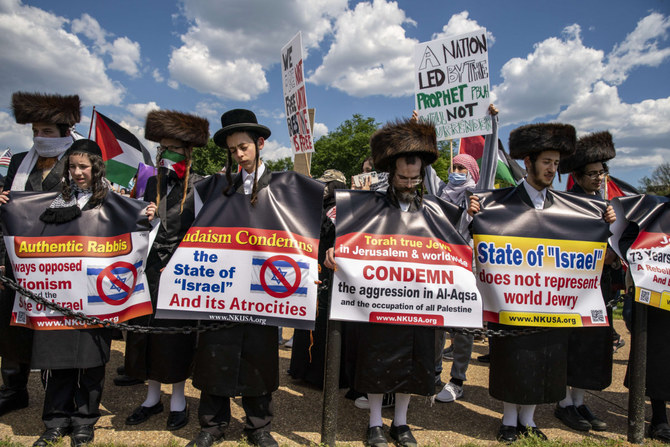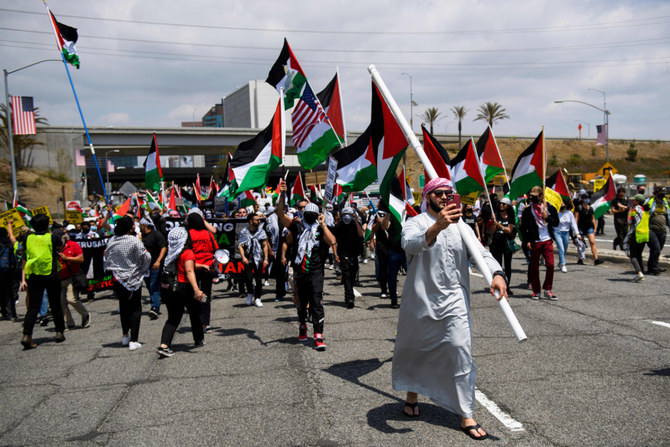GAZA CITY/LONDON/NEW YORK: Palestinians on Saturday marked the anniversary of the Nakba, the “catastrophe” when more than 700,000 were driven from their homes to establish the state of Israel in 1948.
Israel observed the day by killing two women and eight children from one family in an airstrike on a refugee camp.
Three heavy missiles also destroyed the 12-story Al-Jala’a Tower in Gaza City, which housed the offices of media outlets including The Associated Press and Al Jazeera, and bombed the home of Khalil Al-Hayeh, a senior Hamas leader.
Israeli airstrikes on Gaza have killed at least 139 people, including 39 children and 22 women.
Hamas has fired hundreds of rockets into Israel and killed eight people, the latest on Saturday when a man died in a rocket strike on the Tel Aviv suburb of Ramat Gan.
There was outrage over the attack on the AP building, which also contained residential apartments. The Israeli military said Hamas was operating inside the building, but offered no evidence.
“The world will know less about what is happening in Gaza because of what happened today,” AP chief executive Gary Pruitt said. “We are shocked and horrified.”
Earlier, an Israeli air raid on the densely populated Shati refugee camp west of Gaza City killed 10 Palestinians from one family, Israel’s deadliest single strike of the conflict.
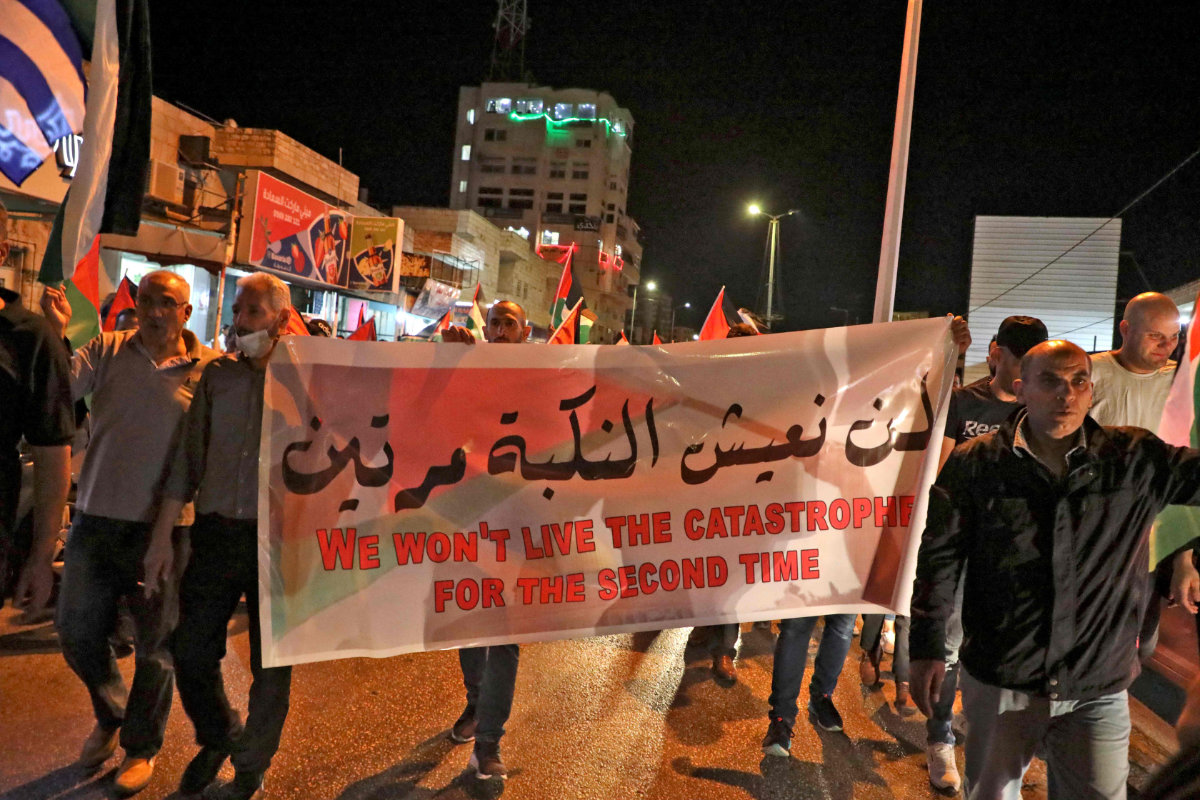
Palestinians burn an Israeli flag in the occupied-West Bank town of Bethlehem on May 15,2021, as they commemorate the Nakba, the "catastrophe" of Israel's creation in 1948. (AFP / HAZEM BADER)
Missiles targeted the three-story home of Alaa Abu Hatab, 35, killing his wife, four of his five children, his sister, and four of her five children. A five-month-old baby survived, along with Abu Hatab’s daughter, who is in intensive care.
Abu Hatab’s brother-in-law Muhammad Al-Hadidi wept as he told Arab News how his children had insisted on spending the night at their uncle’s house to play with their cousins.
“I heard the sound of the bombing, but I did not know it was the building my wife and children were in. I received a call to tell me Abu Hatab’s house was targeted. I went quickly, to find all my children with my wife, under the rubble.”
As Israeli airstrikes continued, Heba Al-Attar, 45, told Arab News: “The feeling I have is, when will I be killed? When will our house be destroyed? How will my three children live without me if they survive? I feel scared every day, I can’t sleep at night.”
Saudi Foreign Minister Prince Faisal bin Farhan and Egyptian Foreign Minister Sameh Shoukry called on Saturday for an immediate ceasefire. They urged “the international community to confront the aggressive Israeli practices against the brotherly Palestinian people.”
Tens of thousands march
As Israeli forces stepped up the bombardment of Gaza, tens of thousands of protesters marched in major European cities including London, Berlin, Madrid and Paris in support of the Palestinian cause.
In London, several thousand protesters carrying placards reading “Stop Bombing Gaza” and chanting “Free Palestine” converged on Marble Arch, near the British capital’s Hyde Park, to march toward the Israeli embassy.
Packed crowds stretched all along Kensington High Street where the embassy is located.
“This time is different,” Palestinian Ambassador Husam Zomlot told the demonstrators.
“This time we will not be denied any more. We are united. We have had enough of oppression.”
Simon Makepace, a 61-year-old accountant told AFP he had joined the protests because “the whole world should be doing something about it, including this country.”
Click here to read our previous stories about the Nakba
'Palestine will be free'
In cities across North America, tens of thousands of pro-Palestinian demonstrators also called for an end to Israeli attacks on the Gaza Strip.
The protests were held on the anniversary of Nakba Day, or “catastrophe,” that saw hundreds of thousands of Palestinians displaced during Israel’s creation in 1947-1948.
Gatherings to show solidarity with Palestinians on the anniversary of Nakba Day, took place in cities including New York, Boston, Washington, Montreal and Dearborn, Michigan.
Several Jewish people attended, carrying placards that said “Not in my name” and “Solidarity with Palestine” as the protesters took over a street in the area which has a large Arab population.
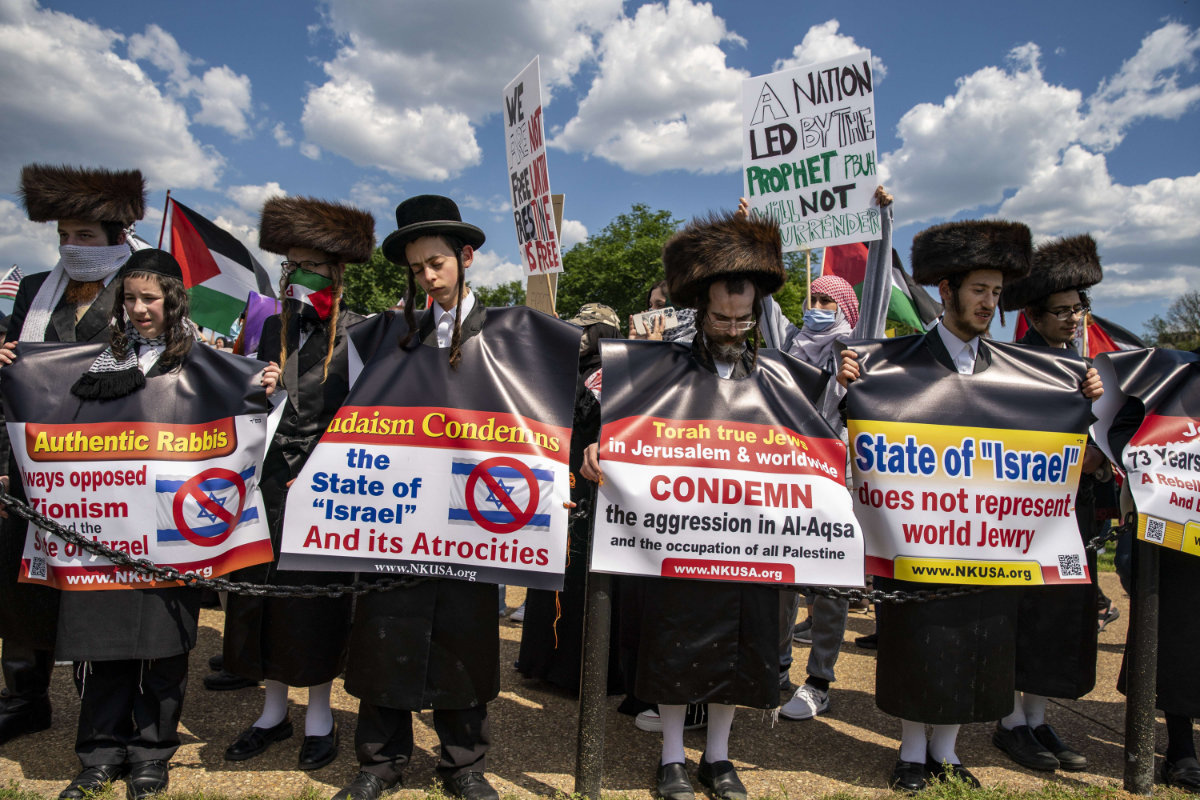
Protesters and activists gather near the Washington Monument in the US capital to voice their anger at Israeli military action in Gaza that has left many civilians dead. (Tasos Katopodis/Getty Images/AFP)
“I’m here because I want a Palestinian life to equal an Israeli life and today it doesn’t,” said 35-year-old Emraan Khan, a corporate strategist from Manhattan, as he waved a Palestinian flag.
“When you have a nuclear-armed state and another state of villagers with rocks it is clear who is to blame,” he added.
Alison Zambrano, a 20-year-old student, traveled from neighboring Connecticut for the demo.
“Palestinians have the right to live freely and children in Gaza should not be being killed,” she told AFP.
Mashhour Ahmad, a 73-year-old Palestinian who has lived in New York for 50 years, said “don’t blame the victim for the aggression.”
“I’m telling Mr. Biden and his cabinet to stop supporting the killing. Support the victims, stop the oppression.
“The violence committed by the Israeli army recently is genocide,” he added, raising a poster above his head that said “Free Palestine, End the occupation.”
President Joe Biden spoke separately Saturday with his Israeli and Palestinian counterparts, expressing his “grave concern” over six days of violence that has left scores dead or wounded.
He expressed Washington’s “strong commitment to a negotiated two-state solution as the best path to reach a just and lasting resolution of the Israeli-Palestinian conflict,” the White House said.
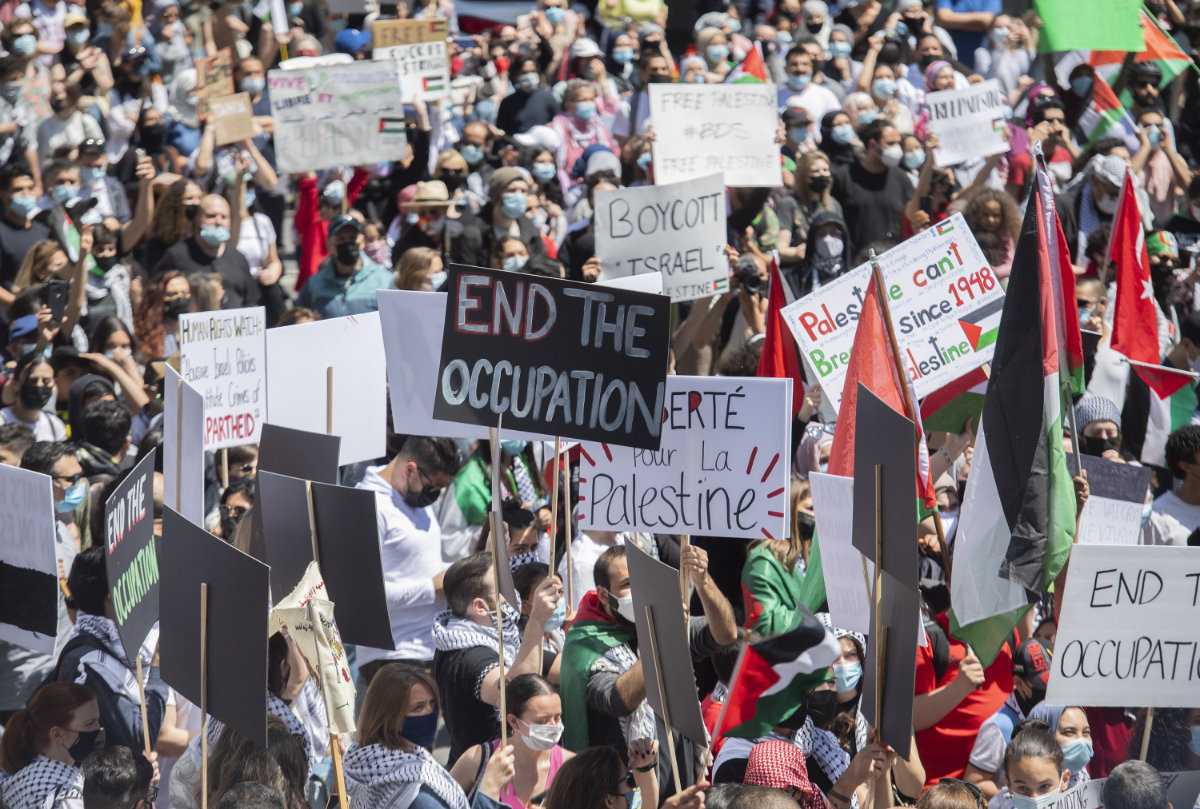
People in Montreal attend a demonstration on May 15, 2021, to denounce Israel's military actions in the Palestinian territories. (Graham Hughes/The Canadian Press via AP)
Throngs of people gathered in Copley Square in Boston, while a few hundred rallied on the Washington Monument grounds in the US capital.
Several thousand demonstrated in Montreal, Canada, calling for “the liberation of Palestine.”
Protesters also denounced “war crimes” committed by Israel in Gaza and carried placards accusing Israel of violating international law during the protest in the center of the Canadian city.
(With AFP)




